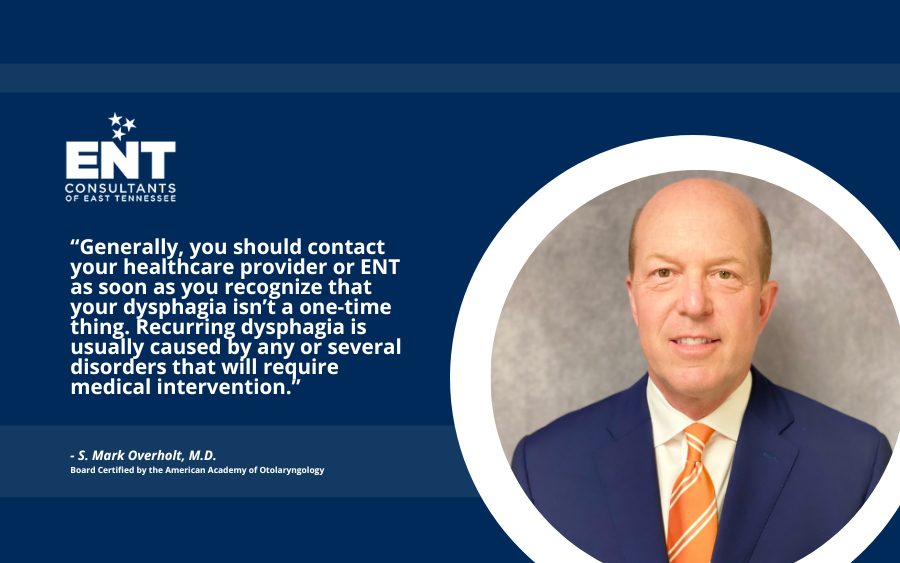Have you experienced the sensation that something you have swallowed is stuck in your throat?
Difficulty swallowing, known as dysphagia, can be pretty disconcerting. When experiencing dysphagia, swallowing may feel uncomfortable or very slow, and you may cough or choke on water, food, or even your own saliva.
Dysphagia is typically a temporary condition, but as a chronic condition, it can be a symptom of another medical condition that requires the attention of a doctor of otolaryngology or an ear, nose, and throat (ENT) doctor.
At ENT Consultants of East Tennessee, we do our best to keep you informed about the various conditions that can impact your health and quality of life. In this blog, we want to raise your awareness of the condition known as dysphagia and provide solutions for those who are experiencing it.
The Process of Swallowing
To better understand dysphagia and its treatment, you need to have a better understanding of the process of swallowing. Swallowing is actually fairly complex and includes multiple muscular contractions working together.
Here are the steps of swallowing that take place in the matter of just a couple of seconds when everything is normal:
- Your tongue moves food or liquid in your mouth to the back of your throat.
- When food enters the throat, a small flap (the epiglottis) covers the windpipe to prevent you from inhaling it into the windpipe (trachea).
- After entering the esophagus, a series of contractions of the esophageal muscles push the food down into your stomach.
- A final ring of muscles at the bottom end of the esophagus (lower esophageal sphincter, or the LES) opens up to allow the food to empty into the stomach.
Dysphagia occurs whenever there is a dysfunction in any one or more of these processes.
Three Different Types of Dysphagia
The most common types of dysphagia occur in any of three locations along the path foods or liquids follow, including your mouth, throat (pharynx), and the esophagus. Here are some short descriptions of each of these swallowing dysfunctions.
Oral Dysphagia
For patients experiencing oral dysphagia, the process of chewing and/or the production of saliva, which helps soften the food so it more easily breaks apart, malfunctions, disrupting the beginning of the swallowing process.
Oropharyngeal Dysphagia
If your tongue pushes food or liquid to the back of your throat and the epiglottis does not close, it will enter the trachea. The result of this dysfunction is coughing or choking, and the condition is known as oropharyngeal dysphagia, or transfer dysphagia, because it involves problems transferring food from your mouth to your throat.
Esophageal Dysphagia
If you are experiencing esophageal dysphagia, the muscles in your esophagus are not contracting properly to move food or drink down to your stomach in a wave-like motion called peristalsis.
Three Primary Causes of Dysphagia
The primary causes of dysphagia can be divided into three different classifications: nervous system and brain disorders, muscular disorders, and narrowing or blockages. Each of these classifications is the general cause, but in each case, there can be a variety of more specific causes.
Nervous System and Brain Disorders
Different types of medical conditions or injuries can affect your brain and nervous system, which leads to dysfunctions of the nerves that control the muscles used in the swallowing process, including:
- Amyotrophic lateral sclerosis (ALS)
- Brain tumors
- Cerebral palsy
- Dementia
- Multiple sclerosis (MS)
- Parkinson’s disease
Muscle Disorders
In some cases, the proper contraction of the muscles needed for swallowing does not function properly for reasons not related to the nervous system or brain disorders. These conditions involve dysfunctions in the muscles of your head and neck that are connected to the process and may include:
- Achalasia
- Cricopharyngeal Spasms (abnormal contractions)
- Esophageal Spasms
- Muscular Dystrophy
- Myasthenia Gravis
- Myositis
- Scleroderma
Narrowing and Blockages
Various structural issues, like narrowing and other malfunctions or obstructions, can create blockages in the esophagus, making it difficult to swallow. These conditions may be caused by:
- Cancerous or Benign Tumors
- Eosinophilic Esophagitis (stiffness)
- Esophageal Diverticulum
- Esophageal Webs and Schatzki Rings
- GERD (acid reflux disease)
Because each of these medical conditions can be the reason you are experiencing difficulty when you try to swallow, dysphagia can be a symptom of a more serious medical condition that requires treatment by an ENT specialist.
Five Primary Treatment Options for Dysphagia
Eliminating the cause of a swallowing disorder is the primary objective of the various forms of interventions used by otolaryngologists or ENTs to treat dysphagia. Treatment typically focuses on making swallowing safer and on easing your discomfort.
Depending on your diagnosis, your doctor will intervene with any of five general treatment options, including:
- Medications: Muscle relaxers to relax certain muscles in the esophagus, proton pump inhibitors and other medications to treat GERD, antibiotics to treat infection, corticosteroids to treat dysphagia due to an allergic reaction, and other medications to minimize symptoms of a neurologic disorder.
- Swallowing Retraining Therapy (SRT): A therapeutic approach that involves retraining muscles to improve swallowing and reduce the risk of choking and aspiration. SRT is usually performed by speech-language pathologists. This form of therapy can be especially helpful for people with dysphagia caused by neurological disorders, as well as those who’ve had surgery on the throat muscles.
- Surgery and Other Procedures for Swallowing Problems: Surgical procedures to correct dysphagia typically involve an endoscope (a lighted, flexible tube) inserted through the mouth. This approach is typically used in the treatment of achalasia, esophageal diverticulum, to widen a narrow esophagus or to remove blockages.
- Diet Modification and Behavioral Changes: This approach often involves eliminating foods that cause swallowing problems or changing their consistency as well as changing your posture or the positioning of your head when you swallow.
- Enteral Feeding (Feeding Tube): When a swallowing disorder prevents eating enough to maintain weight, feeding tubes are sometimes necessary to provide a way for nutrition to bypass the problem area while decreasing the risk of coughing and choking. This is typically a temporary solution for those who have lost a substantial amount of weight or prevent aspiration pneumonia due to the swallowing disorder.
When You Should Call Your Doctor
When should I call my healthcare provider about difficulty swallowing?
Generally, you should contact your healthcare provider or ENT as soon as you recognize your dysphagia isn’t a one-time thing. Recurring dysphagia is usually caused by any or several disorders that will require medical intervention.
If you are struggling to breathe, something is caught in your throat, or you experience sudden muscle weakness or paralysis, contacting EMS immediately is critical.
ENT Consultants of East Tennessee has a team of specialists able to provide solutions for dysphagia and other dysfunctions affecting your throat. If you’re struggling with swallowing, contact us online to schedule a consultation by using this link or give us a call at (865) 693-6065.


